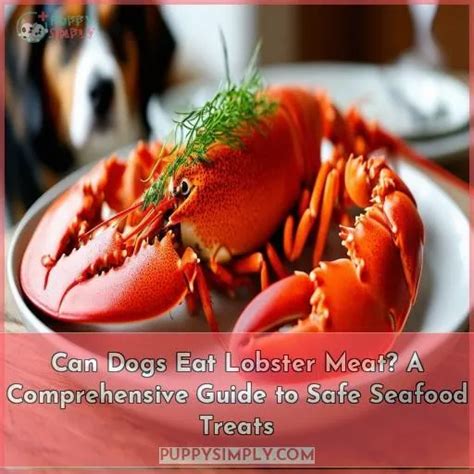Dogs and lobster - a combination that may seem like a luxurious treat for your furry friend. However, before sharing a lobster with your dog, it's essential to consider whether it's safe for them to eat.
Lobster can be a nutritious and protein-rich food for dogs, but it's crucial to approach with caution. The risks associated with feeding lobster to dogs are largely related to the potential for food allergies, choking hazards, and the possibility of shellfish toxicity.
The Benefits of Lobster for Dogs
In moderation, lobster can be a healthy treat for dogs. It's an excellent source of protein, omega-3 fatty acids, and various vitamins and minerals. However, it's essential to note that dogs have different nutritional needs than humans, and lobster should not replace their regular dog food.

The Risks of Feeding Lobster to Dogs
While lobster can be a nutritious treat, there are several risks to consider:
- Food Allergies: Some dogs may be allergic to shellfish, including lobster. If your dog has a food allergy, feeding them lobster can trigger an allergic reaction, leading to symptoms such as itching, hives, and digestive issues.
- Choking Hazards: Lobster shells can be a significant choking hazard, especially for small dogs. If your dog ingests a large piece of shell, it can become lodged in their throat or digestive tract, causing serious harm.
- Shellfish Toxicity: Shellfish, including lobster, can contain toxins that can harm dogs. These toxins can cause symptoms such as vomiting, diarrhea, and lethargy.
How to Safely Feed Lobster to Your Dog
If you still want to share lobster with your dog, here are some guidelines to follow:
- Cook the Lobster: Cook the lobster thoroughly to reduce the risk of foodborne illness and shellfish toxicity.
- Remove the Shell: Remove the shell and any bones or cartilage to minimize the risk of choking hazards.
- Feed in Moderation: Feed lobster in moderation, as an occasional treat. Avoid making it a regular part of their diet.
- Watch for Signs of Allergies: Monitor your dog for signs of food allergies, such as itching, hives, and digestive issues.
- Consult with Your Veterinarian: If you're unsure about feeding lobster to your dog, consult with your veterinarian for personalized advice.

Alternatives to Lobster
If you're looking for alternative protein sources to feed your dog, consider the following options:
- Chicken: Cooked, boneless chicken is a nutritious and easily digestible protein source for dogs.
- Salmon: Cooked salmon is a rich source of omega-3 fatty acids and can be a healthy treat for dogs.
- Sweet Potatoes: Cooked sweet potatoes are a nutrient-rich, easily digestible treat for dogs.
Gallery of Dog-Friendly Foods





Frequently Asked Questions
Can dogs eat lobster shells?
+No, dogs should not eat lobster shells. The shells can cause choking hazards and digestive issues.
Is lobster a healthy treat for dogs?
+In moderation, lobster can be a healthy treat for dogs. However, it's essential to cook the lobster and remove the shell to minimize the risks of food allergies and choking hazards.
What are some alternative protein sources for dogs?
+Some alternative protein sources for dogs include cooked chicken, salmon, and sweet potatoes.
By understanding the risks and benefits of feeding lobster to your dog, you can make informed decisions about their diet. Remember to always prioritize your dog's health and safety, and consult with your veterinarian if you have any concerns.
